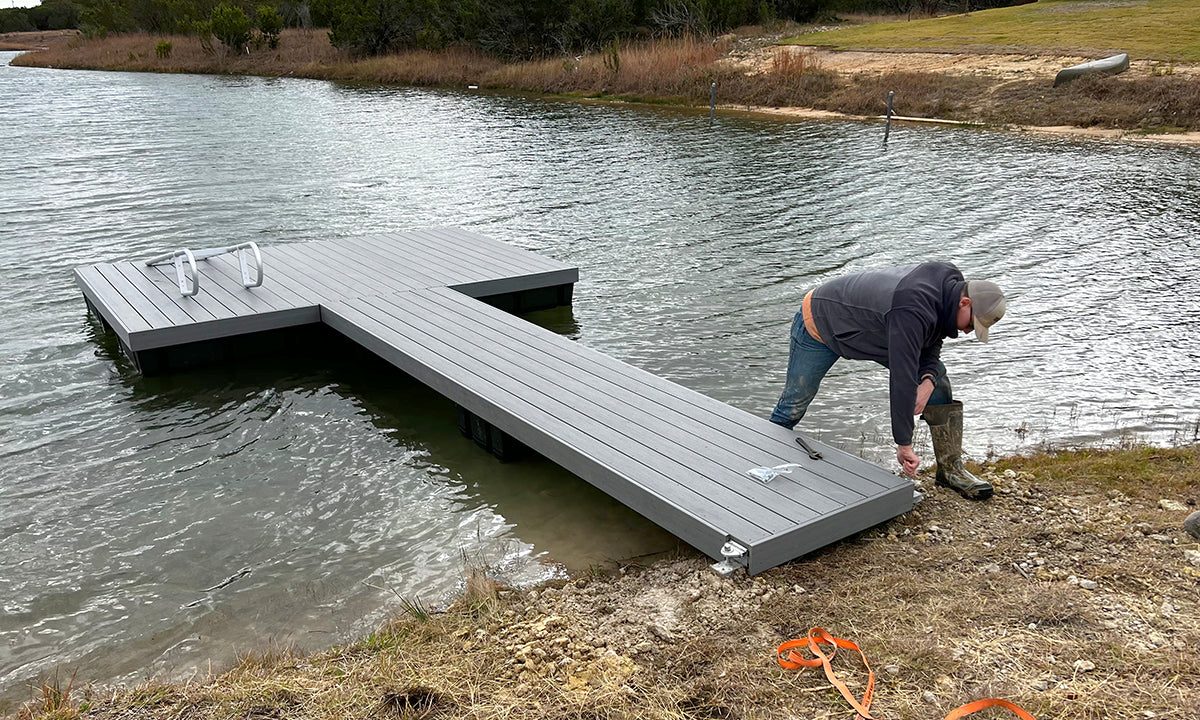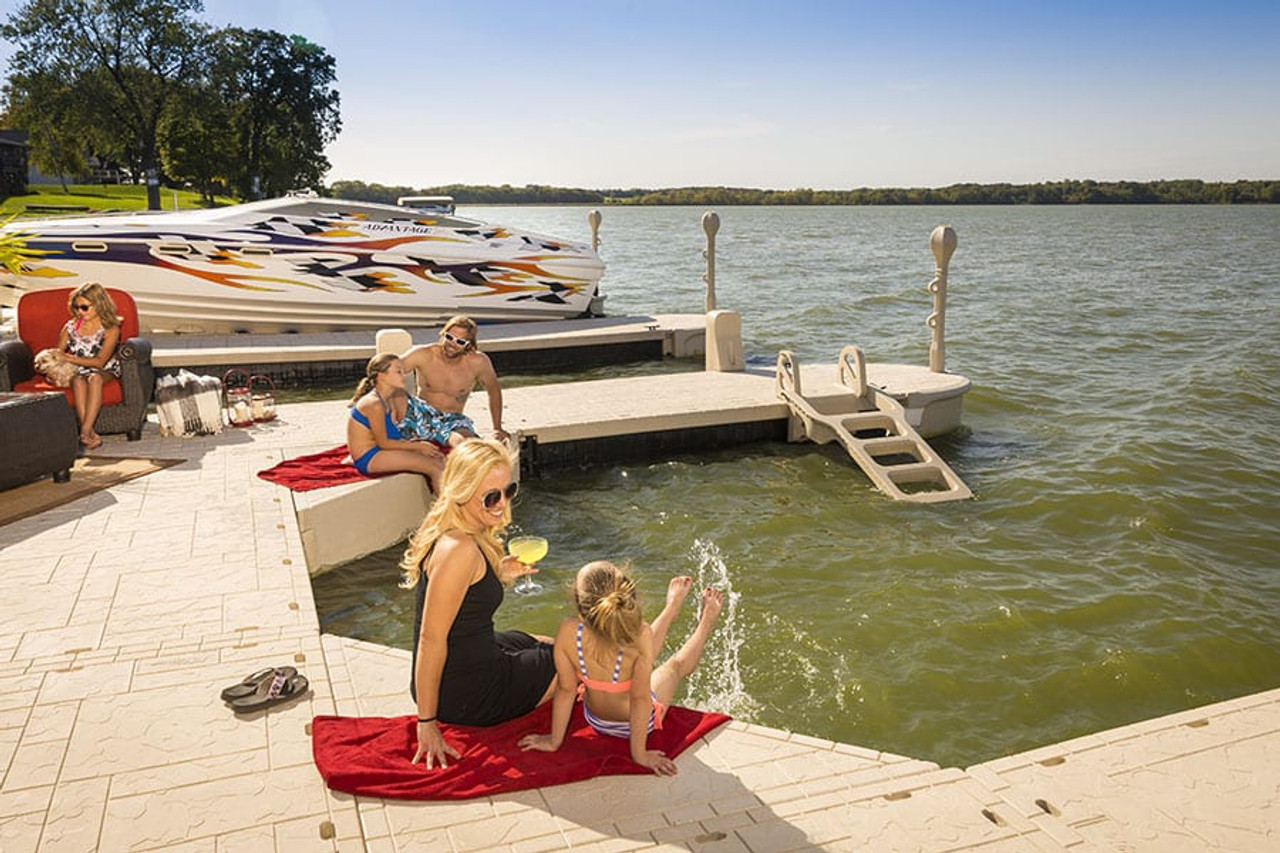How to Select the Right Floating Dock Builder for Your Custom-made Dock Needs
How to Select the Right Floating Dock Builder for Your Custom-made Dock Needs
Blog Article
The Ultimate Overview to Selecting the very best Floating Docks
Choosing the suitable floating dock calls for a detailed understanding of different elements that affect both efficiency and long life. Variables such as dock kinds, materials, and necessary features dramatically impact your decision-making process.
Understanding Floating Dock Types
When choosing a drifting dock, it is important to understand the various kinds readily available, as each serves distinctive purposes and applications. Floating docks mainly fall right into 3 categories: modular, stationary, and pontoon docks.
Modular docks are made up of private areas that can be conveniently assembled or reconfigured, making them perfect for transforming water degrees and varied uses, such as industrial operations or recreational tasks. Their adaptability enables modification based on details needs.

Pontoon docks are characterized by their resilient structure, usually made up of several pontoons that supply stability and support. They are especially appropriate for larger vessels and are typically used in marinas or for waterfront buildings. Comprehending these types aids in choosing one of the most proper floating dock to meet details requirements, guaranteeing optimal functionality and security.
Trick Materials for Durability
Choosing the right products for floating docks considerably impacts their toughness and longevity. The most usual materials consist of timber, plastic, steel, and composite products, each offering distinct advantages and restrictions.
Timber, typically favored for its visual allure, requires routine maintenance to endure moisture and decay. Pressure-treated lumber can enhance resistance to rot, but it might still be at risk to parasites and weathering.

Plastic docks, made of high-density polyethylene (HDPE), are immune to rust, UV radiation, and impact, making them a popular choice for seaside atmospheres. Their light-weight nature likewise promotes easy installment and moving.
Metal docks, typically constructed from light weight aluminum or galvanized steel, provide exceptional toughness and longevity. They are resistant to deterioration, specifically when treated, yet might require extra insulation to avoid warmth accumulation in warm climates.
Composite materials, integrating wood fibers and plastics, deliver the benefits of both timber and plastic, withstanding moisture and fading while calling for minimal maintenance. - floating dock builder
Inevitably, the option of materials need to line up with ecological problems, meant usage, and upkeep choices to make sure the floating dock stays practical and aesthetically pleasing in time.
Crucial Attributes to Take Into Consideration
While the selection of materials is critical, thinking about crucial attributes for floating docks is equally vital to make sure optimal performance and user contentment. One crucial function to evaluate is the dock's buoyancy ability, which identifies just how much weight it can support without submerging. floating dock services. This is vital for suiting boats, individual boat, and even leisure activities
Additionally, portability is a considerable consideration. Relying on your demands, you might desire a dock that is simple to disassemble and deliver, especially if you plan to transfer it seasonally. Security is one more necessary feature; a well-designed floating dock needs to minimize motion caused by wind and water currents, offering a safe system for customers.
Safety and security functions, such as non-slip surface areas and rounded edges, are also essential to prevent mishaps, especially in damp problems. Consider the accessibility of accessories, such as cleats, ladders, and bumpers, which can enhance the performance of your dock.
Installation and Maintenance Tips
Establishing and preserving a floating dock needs cautious preparation and interest to information to guarantee its long life and optimal performance. Begin by selecting a suitable area that decreases direct exposure to strong currents and waves, which can trigger damage. Make sure that the water deepness suffices for the dock's height and that it is secured securely to stop movement.
Throughout installation, adhere to the manufacturer's guidelines carefully, as improper assembly can jeopardize security. Use premium products resistant to corrosion, such as light weight aluminum or dealt with wood, to enhance durability. Consistently evaluate all elements, including floats, connectors, and anchoring systems, for indicators of damages or wear.
Upkeep is essential for prolonging the life of your dock. Tidy the surface areas regularly to avoid algae buildup and check for useful reference any type of loosened fittings that might require tightening up. If your dock uses flotation devices, ensure they stay free and undamaged from slits. In addition, think about using safety finishes to wood parts to lower weathering impacts. By sticking to these setup and upkeep click reference tips, you can take pleasure in a trusted and practical floating dock for years to come.
Budgeting for Your Dock
Budgeting for your dock is an important action that can substantially influence your total complete satisfaction and investment in a waterfront building. Establishing a clear budget plan helps you navigate the numerous choices available and ensures you make notified decisions that line up with your monetary capacities.
Begin by establishing the size and style of the dock you need, as these variables will substantially affect the price. Floating docks can differ considerably in rate, depending upon products, buoyancy, and functions like ramps and devices. Study different producers and distributors to compare prices and comprehend the market value.
Along with preliminary costs, think about ongoing expenditures such as maintenance, insurance coverage, and potential repair work. Assign funds for these reoccuring costs to avoid shocks down the line. It's also prudent to allocate any necessary authorizations or assessments, which might be needed by local regulations.
Last but not least, remember the prospective roi. A well-planned dock can enhance your building's value and allure, providing a positive monetary effect in the long-term. By budgeting properly, you can ensure that your dock fulfills your demands without compromising your financial stability.
Verdict
In conclusion, picking the excellent floating dock necessitates a detailed examination of various factors, consisting of dock types, products, essential attributes, and setup processes. Careful consideration of financial constraints will certainly further make sure a sound financial investment.

While the selection of materials is critical, considering essential attributes for floating docks is just as crucial to ensure optimum efficiency and customer complete satisfaction.Establishing up find more and preserving a drifting dock needs careful planning and interest to information to guarantee its long life and optimum performance. Floating docks can differ dramatically in rate, depending on products, buoyancy, and attributes like ramps and devices.In verdict, picking the ideal floating dock necessitates a complete examination of various factors, consisting of dock kinds, materials, vital functions, and installation processes.
Report this page